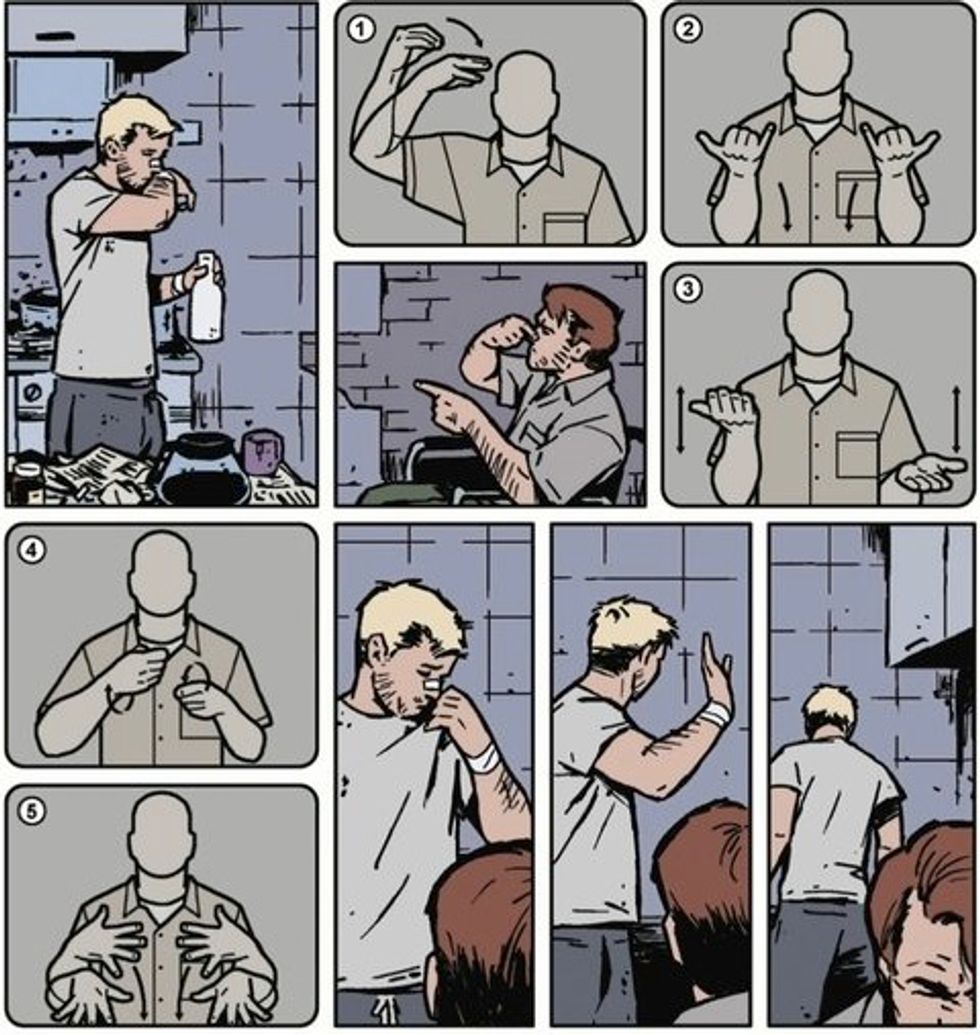The 1979 film "And Your Name is Jonah" (currently available on Netflix) opens on what appears to be a number of impaired boys being cared for by nurses in a children's asylum. However, not all of the boys are impaired. Jonah is a deaf boy, misdiagnosed and labeled "retarded." In the scenes to follow, Jonah's parents take him home after three years of institutionalization and begin their struggle against a society that continues to stigmatize the deaf.
I was tasked with watching "And Your Name is Jonah" this summer, for a class on American Sign Language (ASL) at Boston University, a center of deaf studies on the East coast. Like any other language, ASL requires its users to use books, film, and other media to understand the culture that it represents. In this case, that is deaf culture in the United States.
Of course, some people deny the legitimacy of ASL and deaf culture. Many people assume that ASL, among other signing languages, cannot express works of literature as well as spoken and written languages. They think that deaf people do not have their own art or history.
The Merriam-Webster dictionary defines "culture" as:
- the beliefs, customs, arts, etc., of a particular society, group, place, or time.
- a particular society that has its own beliefs, ways of life, art, etc.
- a way of thinking, behaving, or working that exists in a place or organization (such as a business)
Deaf people have all of this and more: They have their own set of customs, art, folk tales, and sometimes even their own sporting competitions and clinics! The history of American Sign Language is older than that of the United States and the history of deaf people in the United States is even more extensive. In their book, "The People of the Eye," Richard C. Pillard (Prof.), Harlan Lane (Prof.), and Ulf Hedberg trace "deaf people in America to colonists from Weald, England, who famously populated an area on Martha’s Vineyard." They make "a strong case for a shared deaf ancestry" and argue that the deaf should be formally recognized as an "ethnic group." This would "afford the deaf not just a greater respect, ...but could finally dispel the assumption that deaf people consider themselves handicapped or as failing to meet an accepted physical ideal of wholeness and health."
It is wrong to consider deaf people in any way impaired and worse still to assume that a deaf person wants to be "cured." Although the case may be different for people who become deaf later in life, for many deaf people, to become "hearing" would be to give up a thriving culture and community. Moreover, some deaf people are adept at reading lips, but not all. Deaf people have their own language and that needs to be respected.
"And Your Name is Jonah" was a cheap, straight-to-television production, but it managed to stir up interest in these and other deaf issues. Like viewers at the time of the film's airing, Jonah’s parents’ are ignorant of deaf culture and what resources are available for their son. The film uses this to educate its audience about the plight of the deaf community. And as the family, primarily Jonah's mother, is forced to rely on the opinions and theories of any self-proclaimed expert she comes into contact with, the lack of knowledge among the medical professionals becomes disturbing. From hospital staff to hearing impairment specialists, it is as if no one understands that Jonah is deaf.
During screenings meant to measure Jonah’s range of hearing ability, those professionals conducting the screenings speak to him. They give him directions in a language he knows nothing of, wasting his time and his parents’ money. One specialist went so far as to reprimand Jonah’s mother on her use of the term “deaf.” She and her colleagues preferred the term “hearing impaired,” she explains. (Keep in mind that the term "retarded" is liberally used in this film.) The aim here is not to avoid offending the deaf but to eradicate the idea that they are deaf at all.
The staff at the school for deaf children which Jonah's parents enroll him in are equally as ignorant. On first meeting the school’s principal, Jonah’s mother is told that Jonah’s hearing aid — an awkward machine, strapped to his stomach, that produces sounds like those of a drowning cat — is his “best friend,” and that Jonah will study with the goal to accustom himself to the “hearing world.” The principal claims that to remain deaf is to be a “failure” and would rather have her students settle for a muddled form of oral communication than experiment with hand signs.Scenes that take place within the school are some of the most shocking. Students are made to wear their names on a string around their necks and are punished by being forced to stand alone in a corner whenever they become frustrated with their lessons. Jonah’s instructor regularly invades her students’ space, grabbing their faces by the chin and forcing them to feel her face and throat for vibrations. When Jonah’s mother comes to the decision to have Jonah learn ASL, the principal of the school even threatens to tie his hands together, in case he were to use signs in class.
The film remains relevant today only as an introduction to deaf culture and how it has been repressed throughout history.
Unfortunately, when "And Your Name is Jonah" was first aired, CBS failed to include open-captioning for deaf viewers. In a 2009 article, one such viewer, hearing loss expert Jamie Berke, expressed her frustration at being excluded from the film. "The next day on the school bus, a schoolmate came up to me and exclaimed, 'Oh, Jamie! I saw "And Your Name is Jonah!" I think I understand you better now!' I angrily snapped back, 'I couldn't understand it! There were no captions!'" Berke wrote. She coined the term "Jonah syndrome" to describe instances in which the needs of deaf people are blatantly ignored, citing the time "Phyllis Frelich was not shown on screen signing the national anthem during the [1998] Super Bowl." A more recent example would be the fake ASL interpreter at Nelson Mandela's memorial.
Despite the film's lack of captioning, "And Your Name is Jonah" helped hearing viewers to understand the deaf community. Current representation is far from ideal, but there have been some supporting roles for deaf characters in larger productions—H.W. in Paul Thomas Anderson’s film, “There Will Be Blood,” to name one. Many of the works allowing for deaf representation are graphic novels, including a British comic by the name of “Signs & Voices” and, released just one year ago, “Hawkeye" issue No. 19. Despite the watered down depiction of the arrow slinging hero in Marvel's “Avengers” franchise, Hawkeye is, in fact, a deaf superhero.
In issue No. 19 of "Hawkeye," writer Matt Fraction and artist David Aja revive a plot twist from a previous issue in which the hero's hearing was damaged during battle. Inspired by the PBS feature "Signing Time" to teach his own hearing children ASL, Fraction worked closely with the show's creator, Rachel Coleman, while creating "Hawkeye" issue No. 19 and dedicated the issue to Coleman's daughter, Leah. "If it weren’t for her, I wouldn’t know any sign language. Leah being deaf is the reason this is included in this issue," he said.
Ironically, in "And Your Name is Jonah," Jonah is terrified of Hawkeye’s soon-to-be fellow-Avenger, Spiderman. Until Jonah is introduced to ASL and in turn, taught to read, he cannot understand the text in his brother’s comics and mistakes Spiderman for a villain. He even stuffs his brother's Spiderman doll in the oven!
But “Hawkeye" issue No. 19 is a different kind of comic. Intent on conveying the frustration of deaf people, Fraction and Aja left speech bubbles blank and incorporated sign language into the comic, as shown in the image below. Leah Coleman reportedly loves the issue and its unique features, explaining, "Oh my gosh, that is exactly what it is like to be deaf. You know there are conversations going on and they may as well be empty speech bubbles on a page.’”
Now that Marvel has promised us both a "Wonder Woman" film and a "Black Panther" film, maybe "Hawkeye" will be next to appear on the big screen, and maybe he will be deaf!





















